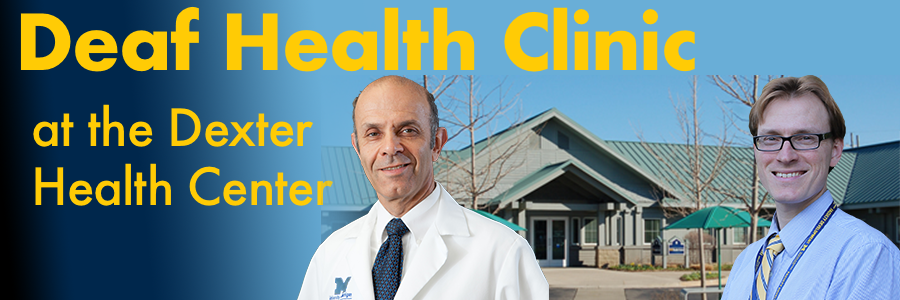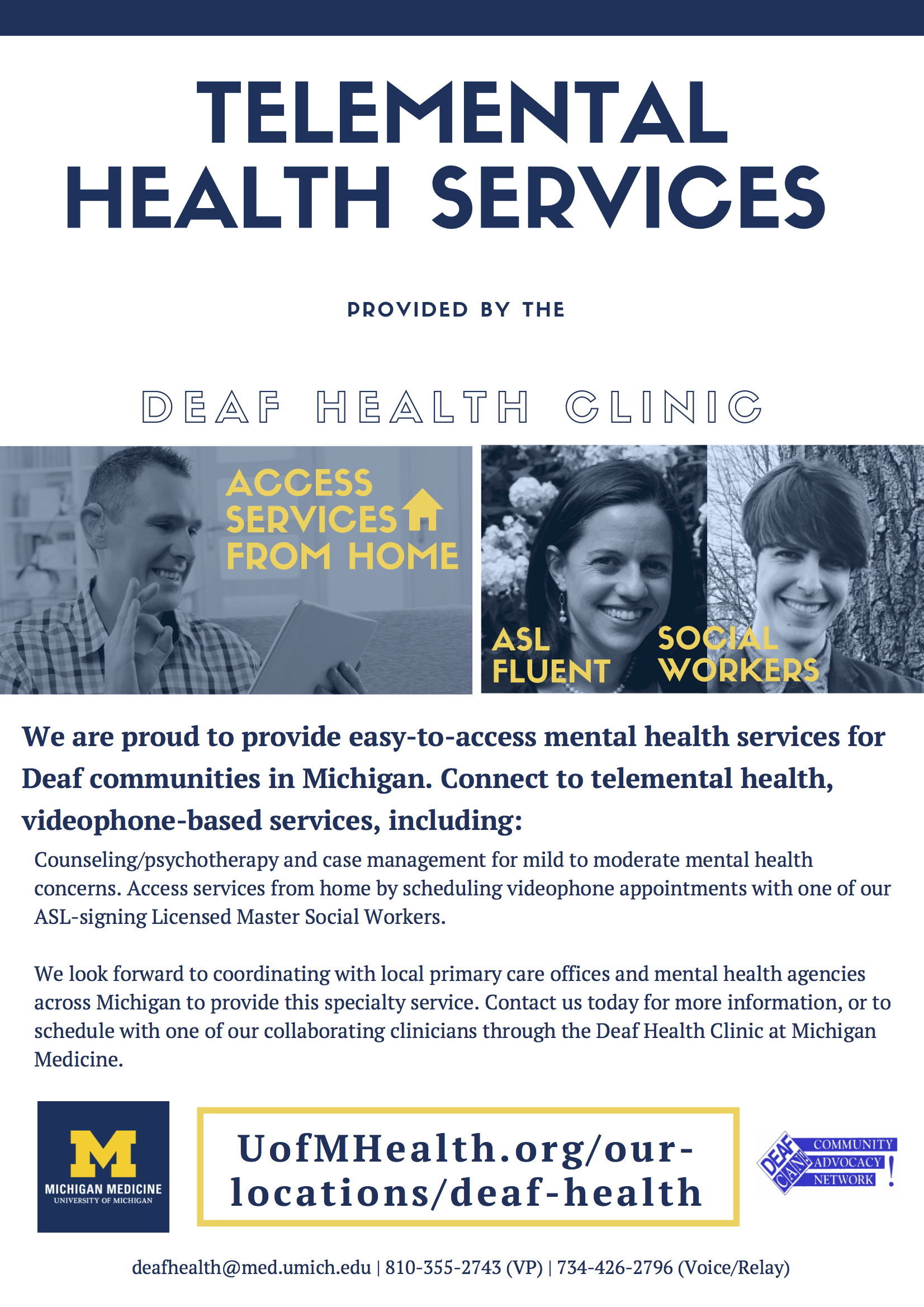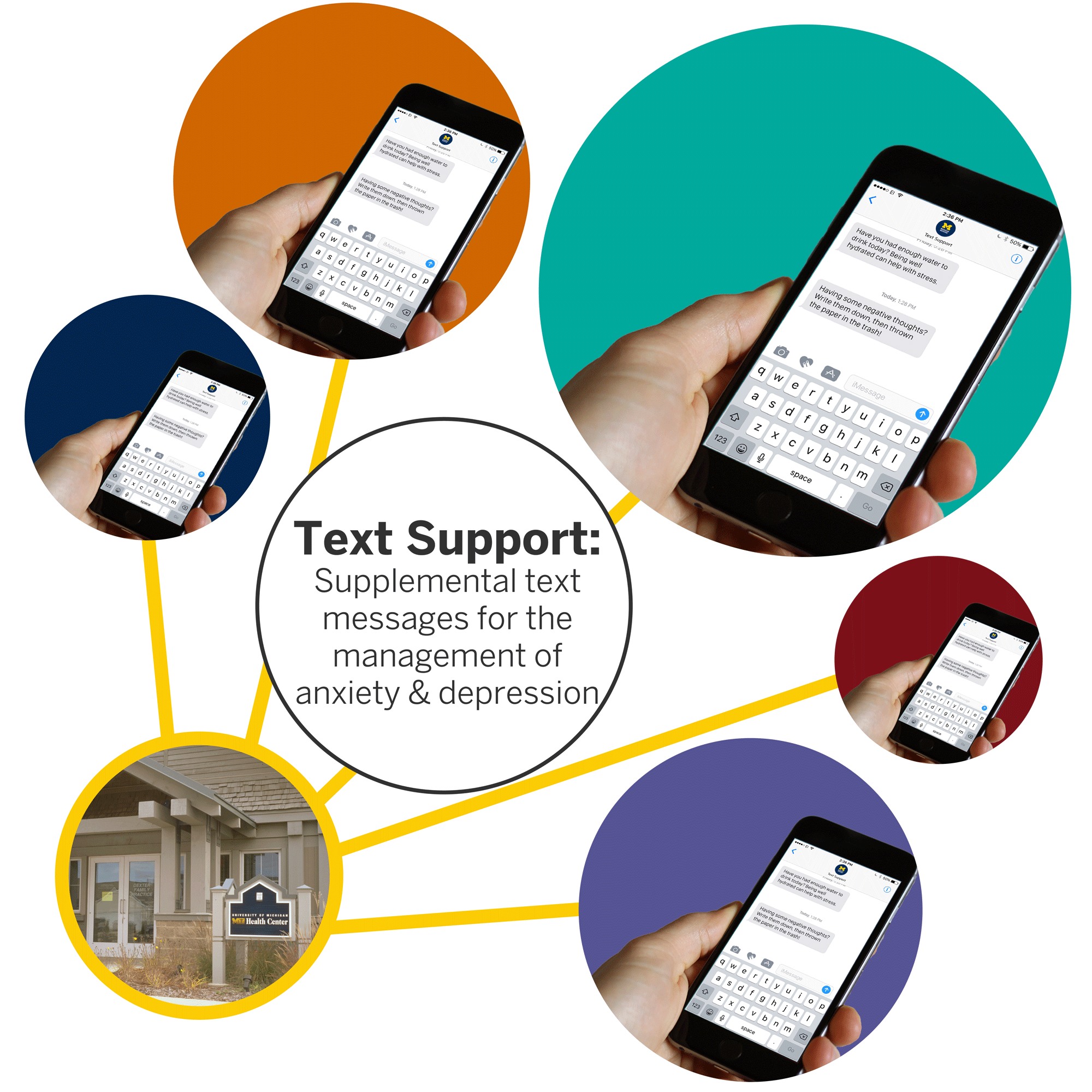
The Deaf Health Clinic (DHC), based at the Dexter Health Center, serves deaf patients from across the state of Michigan, providing a full range of primary care services, including prenatal care and in-person and virtual mental health counseling by a team of physicians and clinical social workers who are fluent in American Sign Language (ASL). The Deaf Health Clinic was established and is led by two deaf family physicians, Philip Zazove, M.D., Chair and the George A. Dean M.D. Professor of Family Medicine, and Michael M. McKee, M.D., M.P.H., assistant professor. Both Zazove and McKee are active in Deaf professional and community organizations and are leading clinician-investigators in the field of deaf health research. McKee has served as past president of the Association of Medical Professionals with Hearing Losses (AMPHL) and currently hold appointments on the State Advisory Council on Deaf, DeafBlind and Hard of Hearing, the Roundtable on Health Literacy of the National Academies of Sciences, Engineering, and Medicine, and the National Research Center for Parents with Disabilities.
The Deaf Health Clinic has secured funding through a multi-year Medicaid Match Grant, to provide virtual mental health services, free of charge, to deaf Michiganders who qualify. Both in-person and telemedicine mental health services are led by Leslie Pertz, LMSW, NIC, an ASL-Certified Interpreter and licensed social worker. Clinicians at the Deaf Health Clinic provide outreach to Deaf communities throughout Michigan, partnering with the Deaf Community Advocacy Network (Deaf CAN), a non-profit organization that works with deaf and hard of hearing people in southeastern Michigan and attending Deaf community events.
The Deaf Health Clinic is also engaged in deaf online communities. Social worker Pertz provides video blogs in American Sign Language (ASL) on a variety of mental health topics, ranging from demystifying the counseling process to how to respond to those who may have thoughts of suicide. Pertz has also produced a series of over 50 short ASL videos for a pilot text-messaging service that focuses on boosting mood and providing text-message based support between therapy sessions.
McKee also incorporates technology into his outreach, recently streaming his in-person Deaf Health Talk series via Facebook Live. The series--on popular topics like managing and preventing diabetes and addressing fatigue--is held at community locations across Michigan, most recently in Livonia and Dexter. McKee also produced a video on the truths and myths of the flu vaccine, with the popular deaf media channel DPAN.TV.
Please read more about the Deaf Health Clinic, in the following feature produced by Michigan Medicine and the University of Michigan Office of Health Equity and Inclusion. For more information, visit the Deaf Health Clinic page.
While Michigan Medicine is the proud home of many innovative clinical operations, many individuals are unaware of its Deaf Health Clinic, one of the few clinics in the U.S. that offers primary care services from two physicians fluent in American Sign Language (ASL), as well as an ASL-fluent mental health clinician within a single location.
The Deaf Health Clinic is located at the Dexter Health Center and is led by Michael M. McKee, M.D., M.P.H., and Philip Zazove, M.D., who have both been with organization for many years.
However, within the past three years, the pair — alongside their team members, Leslie Pertz, LMSW, N.I.C., Kathleen Diehl, LMSW, ACSW and Dylan Secord, M.S.W., LLMSW — has made great efforts to increase the number of staff who use ASL at the academic medical center.
“The Deaf Health Clinic was created for the Deaf community so patients could have a barrier-free health care experience, from check-in to check-out,” said Pertz.
“We now have a front desk clerk who is able to sign with patients, a medical assistant who is currently learning ASL (and actively uses it with patients) and a scribe who is also in school to become an ASL/English interpreter. We are also very excited about adding a nurse practitioner student, who also happens to be Deaf, to our team next year.”
A broad range of services

The Deaf Health Clinic is a family medicine clinic that is also integrated with behavioral health. Therefore, a broad range of primary care and mental health services are available to patients in a single location.
Through the work of Pertz and her team, the clinic piloted tele-mental health services over the last several years. And through this innovative process — which allows experts to virtually meet with patients via videoconferencing — mental health services were made more accessible to Deaf individuals in rural areas of Michigan (using ASL).
“In addition to our tele-mental health efforts, we also host ongoing patient education sessions called ‘Deaf Health Talks’ that serve as educational forums for the community regarding diabetes, obesity, fatigue, high blood pressure and other health-related topics,” said Pertz. “We also hope to start a Deaf stress-reduction group in the early fall of this year.”
Effectively serving the Deaf community
Because of the groundbreaking work being conducted through the Deaf Health Clinic, it was recently featured in The Journal of Deaf Studies and Deaf Education. The research conducted by the journal’s authors revealed incredible progress regarding the mental health status of various patients within the clinic.
“Interestingly enough, the journal article’s authors found that patients who visit our clinic report very low levels of anxiety and depression,” said Pertz. “And this speaks volumes in regards to how effectively we are serving the Deaf community. Of course, it makes us very proud of our work.”
Before joining Michigan Medicine, Pertz worked as a full-time ASL/English interpreter, predominantly working in the medical and mental health settings outside of U-M.

“Time and time again, I would witness the barriers to accessing mental health care within the Deaf community due to a general lack of cultural understanding by both clinicians and patients,” said Pertz.
“And right from the beginning of my career, I had a dream to go on to graduate school and watch that barrier come down. This clinic is a small realization of that dream — and while I know we have a long way to go, I cannot believe how lucky I am to work in this clinic with my incredible team.”
Citation for the article referenced: Pertz L, Plegue M, Diehl K, Zazove P, Mckee M. Addressing Mental Health Needs for Deaf Patients Through an Integrated Health Care Model. The Journal of Deaf Studies and Deaf Education. 2018;23(3):240-248. doi: 10.1093/deafed/eny002.
Browse the latest disability health research from the department of family medicine.



